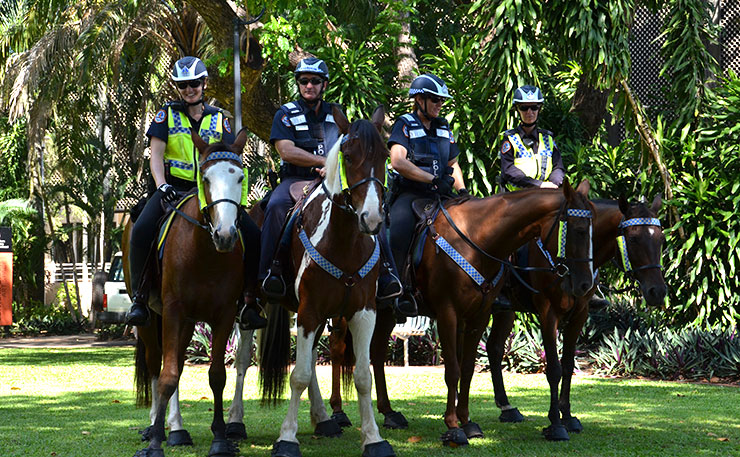OPINION: Critics say opposition to racial profiling hampers police, and accuse activists of being politically correct. But as the evidence makes clear, the discriminatory practice in fact lowers the success rate of searches. On top of harming minority groups it also wastes time and resources, writes Tamar Hopkins.
Victoria Police’s zero tolerance policy on racial profiling has come under attack in recent weeks. Could critics of the policy have a point? Can stopping people based on a profile that includes race be justified?
The research says no.
Rather than improving hit rates, studies have shown that policing based on a hunch or a profile, rather than an objective and reasonable basis for suspicion, actually reduces the effectiveness of the police. That is the hit rate, or rate at which the stop generates a positive result, goes down.
Reasonable suspicion to stop someone includes witnessing a person commit a crime or receiving a report that describes a person fitting the description of the person you intend to stop.
Using a profile (rather than reasonable suspicion) to stop someone includes questioning a person because of their race, poverty, clothing, youth or etc., for example using an identity rather than behaviour or a specific crime report as a basis to act.
During the 2003-2009 period, stops and searches in the United Kingdom requiring reasonable suspicion had a “hit” rate of 10-13 per cent. In contrast stops and searches conducted under suspicion-less powers had hit rates of between three to four per cent. This means up to 97 per cent of people searched were innocent of any crime. This is an extraordinary waste of police time. It is worth noting here that the “hit rate” of suspicion-less stops under UK anti-terrorism legislation is even lower, coming in at 0.5 – 1.5 per cent.
Not only are suspicion-less searches less productive, they are also more racially discriminatory. In the United Kingdom police data from 2014- 2015 shows that black people are searched 16 times more than white people when police do not have a reason. However, when police are required to have a reason, the racial disparity in the search data drops to four to one. This data reveals that suspicion-less searches have an exponentially disproportionate impact on racial minorities. Not only are they a waste of time, they also seriously alienate racial minorities.
Similar results have been found elsewhere. In a study of weapons searches conducted in eight Dutch cities in 2005, it was found that the searches disproportionately targeted minorities and had an extremely low hit rate: 2.5 per cent.
In New York in 2012 a detailed analysis of police data found that:
“Black and Hispanic persons are more likely to be stopped than are White citizens after controlling for crime, the concentration of police and local social conditions.”
The same study noted that drugs were more likely to be found on white people who had been arrested.
In another US study in relation to drivers stopped on the New Jersey Turnpike it was found that while 77 per cent of all consent searches were on black drivers, white people were twice as likely as African Americans to be found with illegal drugs.
These studies all reveal that targeting of racial minorities (whether consciously or otherwise) does not improve the performance of police. Indeed, they reveal using profiles rather than reasonable suspicion in decision-making about whether to stop someone is a huge waste of police resources and results in large numbers of innocent people being targeted.
Ron Iddles, head of the Victorian Police Association, has argued street stops are not about arrests but instead geared towards generating intelligence that can solve crimes. Consequently, it is not the arrest rate we should be using to assess their effectiveness but the intelligence value they provide.
In Toronto, where the practice of stopping people to obtain information without reasonable suspicion is in the process of being banned, the Chief Commissioner Jennifer Evans admitted that there was very little data to show that street stops solved crimes:
“At the time, Evans provided six examples of crimes that were solved with help from street-check data, but admitted her force has “no system” to prove the practice works. Data shows that between 2009 and 2014, Peel police conducted 159,303 street checks and black people were three times more likely to be stopped than whites.”
Even if racial profiling could be justified it must be weighed against the hugely detrimental impact it has on its targets. All forms of race discrimination have serious mental health implications and negative impacts on people’s sense of belonging and feeling of being accepted within society. Racial discrimination is so serious that there are human rights treaties dedicated to its prevention.
Eliminating racial profiling is not about political correctness, it is about evidence. The debate now needs to turn to whether Victoria Police is doing enough to track the prevalence of racial profiling so it can work in an evidence-based way to ensure its elimination.
Donate To New Matilda
New Matilda is a small, independent media outlet. We survive through reader contributions, and never losing a lawsuit. If you got something from this article, giving something back helps us to continue speaking truth to power. Every little bit counts.





